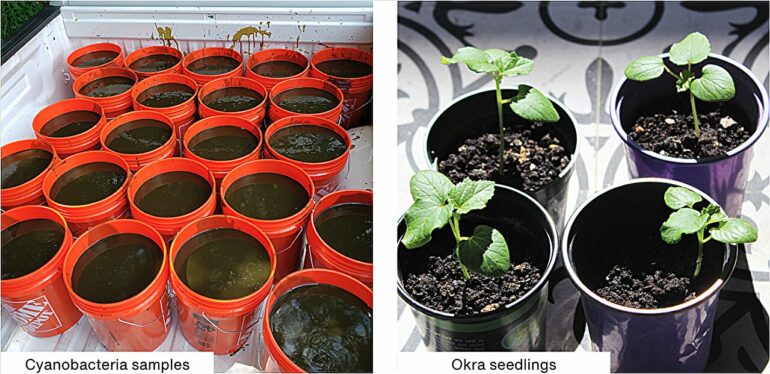One ecosystem’s trash could be another ecosystem’s treasure, according to scientists studying cyanobacteria, more commonly known as blue-green algae.
Cyanobacteria are commonly found in South Florida freshwaters and some are capable of producing a variety of toxins and harmful algal blooms. It also has a high iron content, unlike local crop soils. In a new study published in Environments, researchers found they can actually use cyanobacteria as a biofertilizer in iron deficient soils, turning this economic and environmental threat into a cost-effective solution for local farmers.
“Cyanobacteria as biofertilizers has not been used in South Florida,” Agroecology Professor Krishnaswamy Jayachandran said. “To our knowledge, this is the first study to collect naturally growing cyanobacteria for producing a biofertilizer and demonstrating ecological, environmental, economic and agriculture resilience.”
Jayachandran, along with Earth and environment Professors Leonard Scinto and Mahadev Bhat, Postdoctoral Associate Saoli Chanda and Texas A&M University—Kingsville (TAMUK) soil science Professor Sanku Dattamudi collected a thick mixture of water and algae biomass from Lake Jesup in Central Florida. They repurposed the harvested cyanobacteria slurry to produce biofertilizers for growing high-value organic vegetables—specifically okra.
Researchers used the samples for a two-year experiment at FIU’s Organic Garden Shade House and Greenhouse. Four different treatments were conducted to evaluate the performance of cyanobacteria biofertilizers in the geographical and sub-tropical conditions of South Florida.
“This biofertilizer has 2,000 parts per million iron content which is a remarkable finding that will help farmers and reduce the cost of cultivation,” Jayachandran said. “The unique discovery of rich in iron content is a blessing to South Florida soils.”
Using cyanobacteria as a biofertilizer can improve water quality by reducing nutrient runoff into surface water systems. It also boosts organic matter levels in porous calcareous soil bettering soil aggregation and stability. For farmers, substituting synthetic biofertilizers with cyanobacteria can save them up to 15% in production costs without any loss of crops allowing farmers to stay competitive.
More information:
Saoli Chanda et al, The Application of Cyanobacteria as a Biofertilizer for Okra (Abelmoschus esculentus) Production with a Focus on Environmental and Ecological Sustainability, Environments (2024). DOI: 10.3390/environments11030045
Provided by
Florida International University
Citation:
Study highlights the potential of cyanobacteria as biofertilizers (2024, March 29)



